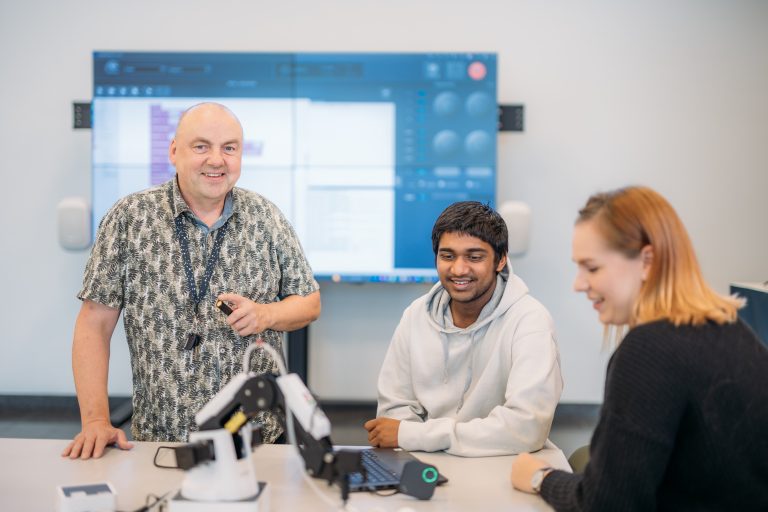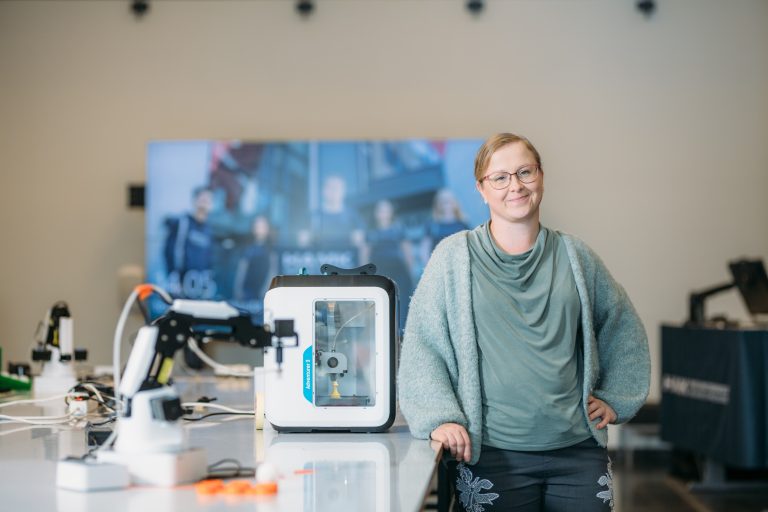
Competence management
Competence management and leadership
The operating model for competence management and development introduces a more comprehensive overview of the organisation’s future and the competence needed in the coming years.
Competence is a form of capital that develops in organisations relatively slowly, and its maintenance and development must therefore be given constant attention. In practice, this requires capabilities for increasingly interactive operation where decisions are made on the basis of knowledge built through joint discussions and development efforts.
At HAMK University of Applied Sciences, we are building a next-generation, professionally profiled higher education institution in which people are motivated to keep learning new things. In the future, HAMK University of Applied Sciences will be known as a higher education institution that is strong in education, applied research, competence, modern learning, management, and leadership. Furthermore, the university will become an increasingly significant higher education institution for society as a whole.
Competence-based strategic thinking
Competence-based strategic thinking combines strategic leadership and the development of competence among personnel. The task of the management and supervisors is to engage in continuous dialogue and sketch out the future together with the different actors within the organisation, strengthen the conditions that support the development of competence, and turn the strategy into continuous new competence needs. This, in turn, enables the development of the organisation’s value creation processes by enabling the creation of new, more ambitious strategies based on improved competence capital.
The management and supervisors also need to pay attention to the construction, maintenance and development of collective competence in line with both the strategies and objectives. The operating model for competence management and development provides plenty of opportunities for those who are able to grasp broad concepts and branch out during their working careers.
The competence management, leadership and development model sets particularly high demands on leadership by enabling each employee to be a top expert in his or her own work and operating area.
Comprehensive and co-operative development also promotes the creation of a shared value base where the operation of the entire organisation is geared to supporting the simultaneous development of productivity and quality in the world of work.
The operating model for competence management is based on discussions and on building together a shared future. In the annual performance appraisals, the supervisor and the employee shape together appropriate personal goals for the employee that support their job description and their personal development. Personal goals are part of the unit’s objectives and thus advance the strategic goals of the entire organisation. Thus, the purpose of personal goals is to promote the implementation of the strategy and to increase the employee’s competence in their area of responsibility. Suitably challenging goals also motivate development at work, bring a sense of success, and demonstrate the importance of an employee’s work within the organisation’s overall strategy.
The achievement of the objectives is monitored regularly and their implementation is evaluated annually. In addition, the achievement of the objectives is used to assess the person’s competence development.
Overall assessment
The background to organization’s overall evaluation system is the remuneration system of the AVAINTA collective agreement previously used in the organization, which is applied in the current Sivista collective agreement too.
Employee’s basic salary is determined through an overall assessment based on their work tasks, competence and performance. Organization use an evaluation system that aims to implement a fair and motivating overall assessment. The evaluation system has been developed together with a variety of actors and experts.
The evaluation aims to ensure that the employee’s salary is in accordance with their work tasks, competence and performance. Through objectives that are sufficiently challenging, connected to the overall assessment, and effective for developing the employee’s competence, the employee is also given the opportunity to influence the development of their own pay level.
Personnel training
HAMK100 is a coaching programme for personnel. Key areas of development include renewing higher education pedagogy, digital pedagogy competence and competence in working life, internationality and research. The competence areas are related to the strategic objectives of the university of applied sciences and support the achievement of these objectives.
The training programme supports both personal development and the development of shared competence in work communities. A person can choose from among the coaching option related to their own development path. Different education programmes and units can order tailored coaching and workshops to develop their shared competence.
Well-being at work
Factors that affect well-being at work include opportunities for continuous development, fair and inclusive management, reward systems, interaction, empowerment and learning. In addition to the above factors, the HAMK University of Applied Sciences and the HAMK Vocational Institute are also boosting their personnel’s personal resources through broader occupational health care services, flexible working hours and good opportunities for physical activity.

Strategy
HAMK’s strategy extends to the year 2030. It guides the entire organisation and defines the key objectives that we are determined to achieve.

Quality system
Häme University of Applied Sciences (HAMK) operations and operational management are based on the PDCA (Plan-Do-Check-Act) cycle model.

Working at HAMK
We’re united by the idea of saving our future with real actions.